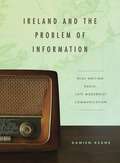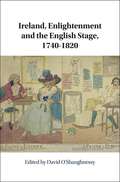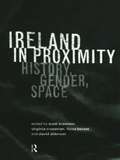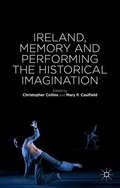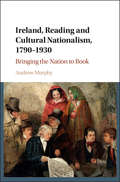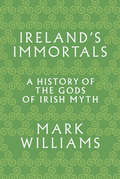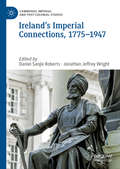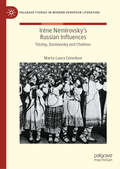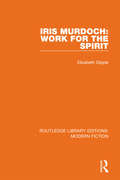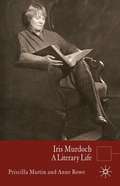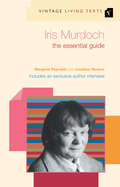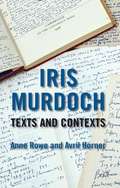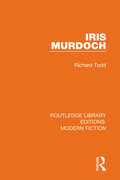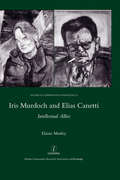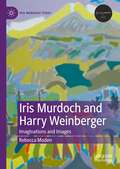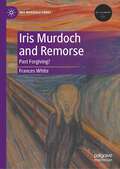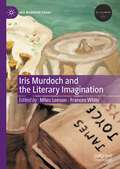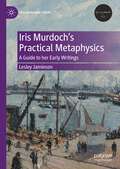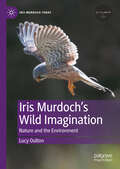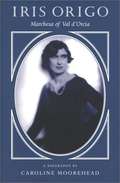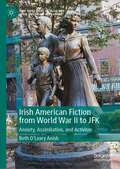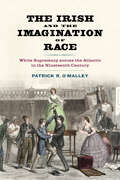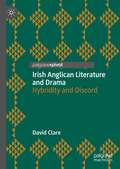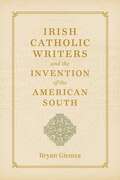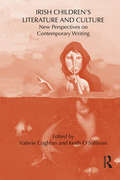- Table View
- List View
Ireland and the Problem of Information: Irish Writing, Radio, Late Modernist Communication (Refiguring Modernism)
by Damien KeaneThough the work of Irish writers has been paramount in conventional accounts of literary modernism, Ireland itself only rarely occupies a meaningful position in accounts of modernism’s historical trajectory. With an itinerary moving not simply among Dublin, Belfast, and London but also Paris, New York, Addis Ababa, Rome, Berlin, Geneva, and the world’s radio receivers, Ireland and the Problem of Information examines the pivotal mediations through which social knowledge was produced in the mid-twentieth century. Organized as a series of cross-fading case studies, the book argues that an expanded sphere of Irish cultural production should be read as much for what it indicates about practices of intermedial circulation and their consequences as for what it reveals about Irish writing around the time of the Second World War. In this way, it positions the “problem of information” as, first and foremost, an international predicament, but one with particular national implications for the Irish field.
Ireland, Enlightenment and the English Stage, 1740-1820
by David O’ShaughnessyThe theatre was a crucial forum for the representation of Irish civility and culture for the eighteenth-century English audience. Irish actors and playwrights, operating both as individuals and within networks, were remarkably popular and potent during this period, especially in London. As ideas of Enlightenment percolated throughout Britain and Ireland, Irish theatrical practitioners - actors, managers, playwrights, critics and journalists - exploited a growing receptivity to Irish civility, and advanced a patriot agenda of political and economic autonomy. Mobility, toleration and the capacity to negotiate multiple allegiances are marked features of this Irish theatrical Enlightenment, whose ambitious participants saw little conflict between their twin loyalties to the Crown and to Ireland. This collection of essays responds to recent work in the areas of eighteenth-century theatre studies, Irish studies and Enlightenment studies. The volume's discussions of genre, colonialism, gender, race, music, slavery, and dress open up new avenues of scholarship and research across disciplines.
Ireland in Proximity: History, Gender and Space
by Scott Brewster Virginia Crossman Fiona Becket David AldersonIreland in Proximity surveys and develops the expanding field of Irish Studies, reviewing existing debates within the discipline and providing new avenues for exploration. Drawing on a variety of disciplinary and theoretical approaches, this impressive collection of essays makes an innovative contribution to three areas of current, and often contentious, debate within Irish Studies. This accessible volume illustrates the diversity of thinking on Irish history, culture and identity. By invoking theoretical perspectives including psychoanalysis, cultural theories of space, postcoloniality and theories of gender and sexual difference, the collection offers fresh perspectives on established subjects and brings new and under-represented areas of critical concern to the fore. Chapter subjects include: * sexuality and gender identities * the historiographical issues surrounding the Famine * the Irish diaspora * theories of space in relation to Ulster and beyond. Contributors inlcude: David Alderson, Aidan Arrowsmith, Caitriona Beaumont, Fiona Becket, Scott Brewster, Dan Baron Cohen, Mary Corcoran, Virginia Crossman, Richard Kirkland, David Lloyd, Patrick McNally, Elisabeth Mahoney, Willy Maley, Shaun Richards, Éibhear Walshe.
Ireland, Memory and Performing the Historical Imagination
by Christopher Collins Mary P. CaulfieldThis book explores the performance of Irish collective memories and forgotten histories. It proposes an alternative and more comprehensive criterion of Irish theatre practices. These practices can be defined as the 'rejected', contested and undervalued plays and performativities that are integral to Ireland's political and cultural landscapes.
Ireland, Reading and Cultural Nationalism, 1790–1930: Bringing the Nation to Book
by Andrew Murphy"The emergence of an Irish 'common reader' in the nineteenth century had significant implications for the evolution of Irish cultural nationalism. The rise of literacy rates prompted a cultural crisis, with nationalists fearing that the beneficiaries of mass education were being drawn to populist publications emanating from London which were having the effect of eroding Irish identity and corrupting Irish morals. This fear prompted an intensification of cultural nationalist activity at the turn of the century. Andrew Murphy's study, which includes a chapter on W. B. Yeats and the Irish reader, moves freely between historical and literary analysis and demonstrates how a developing sense of cultural crisis served as an engine for the Irish literary revival. Examining responses to Irish reading habits advanced by a wide range of cultural commentators, Murphy provides a nuanced discussion of theories of nationalism and examines attempts finally to control reading habits through the introduction of censorship"--
Ireland's Immortals: A History of the Gods of Irish Myth
by Mark WilliamsIreland's Immortals tells the story of one of the world's great mythologies. The first account of the gods of Irish myth to take in the whole sweep of Irish literature in both the nation's languages, the book describes how Ireland's pagan divinities were transformed into literary characters in the medieval Christian era--and how they were recast again during the Celtic Revival of the late nineteenth and early twentieth centuries. A lively narrative of supernatural beings and their fascinating and sometimes bizarre stories, Mark Williams's comprehensive history traces how these gods--known as the Túatha Dé Danann--have shifted shape across the centuries, from Iron Age cult to medieval saga to today's young-adult fiction.We meet the heroic Lug; the Morrígan, crow goddess of battle; the fire goddess Brigit, who moonlights as a Christian saint; the mist-cloaked sea god Manannán mac Lir; and the ageless fairies who inspired J.R.R. Tolkien's immortal elves. Medieval clerics speculated that the Irish divinities might be devils, angels, or enchanters. W. B. Yeats invoked them to reimagine the national condition, while his friend George Russell beheld them in visions and understood them to be local versions of Hindu deities. The book also tells how the Scots repackaged Ireland's divine beings as the gods of the Gael on both sides of the sea--and how Irish mythology continues to influence popular culture far beyond Ireland.An unmatched chronicle of the Irish gods, Ireland's Immortals illuminates why these mythical beings have loomed so large in the world's imagination for so long.
Ireland’s Imperial Connections, 1775–1947 (Cambridge Imperial and Post-Colonial Studies Series)
by Daniel Sanjiv Roberts Jonathan Jeffrey WrightThis edited collection explores the complexities of Irish involvement in empire. Despite complaining regularly of treatment as a colony by England, Ireland nevertheless played a significant part in Britain’s imperialism, from its formative period in the late eighteenth century through to the decolonizing years of the early twentieth century. Framed by two key events of world history, the American Revolution and Indian Independence, this book examines Irish involvement in empire in several interlinked sections: through issues of migration and inhabitation; through literary and historical representations of empire; through Irish support for imperialism and involvement with resistance movements abroad; and through Irish participation in the extensive and intricate networks of empire. Informed by recent historiographical and theoretical perspectives, and including several detailed archival investigations, this volume offers an interdisciplinary and evolving view of a burgeoning field of research and will be of interest to scholars of Irish studies, imperial and postcolonial studies, history and literature.
Irène Némirovsky's Russian Influences: Tolstoy, Dostoevsky and Chekhov (Palgrave Studies in Modern European Literature)
by Marta-Laura CenedeseThis book explores the influence of Tolstoy, Dostoevsky, and Chekhov on Russian-born French language writer Irène Némirovsky. It considers the complexity of each of these relationships and the different modes in which they appear; demonstrating how, by skillfully integrating reading and writing, reception and creation, Némirovsky engaged with Russian literature within her own work. Through detailed analysis of the intersections between novels, short stories and archival sources, the book assesses to what degree Tolstoy, Dostoevsky and Chekhov influenced Némirovsky, how this influence affected her work, and to what effects. To this aim the book articulates the notion of creative influence, a method that, in conversation with theories of influence, intertextuality, and reception aesthetics, seeks to reflect a “meeting of artistic minds” that includesaffective, ethical, and creative encounters between writers, readers, and researchers.
Iris Murdoch: Work for the Spirit (Routledge Library Editions: Modern Fiction)
by Elizabeth DippleOriginally published in 1982, this brilliant study provides a perceptive and up-to-date assessment of the novels of Iris Murdoch, up to and including Nuns and Soldiers, published in 1980. The Fire and the Sun, her book on Plato, is also considered in depth. It is not a critical biography, but rather shows how massive Murdoch’s literary career was at the time and what her contribution has been to aesthetics, literary criticism, the realistic novel, and to the possibilities of ethical and religious action in a horror-filled and secular age. Above all, the book is interested in forwarding Murdoch’s cause among her readers. It is not aimed simply at those who have read and studied all of her novels, the text will appeal to the readers of only a few of them, as well as literary scholars and students of contemporary fiction and modern culture.
Iris Murdoch: A Literary Life
by Priscilla Martin Anne RoweThis largely chronological study of Iris Murdoch's literary life begins with her fledgling publications at Badminton School and Oxford, and her Irish heritage. It moves through the novels of the next four decades and concludes with an account of the biographical, critical and media attention given to her life and work since her death in 1999.
Iris Murdoch: The Essential Guide (Vintage Living Texts #2)
by Jonathan Noakes Margaret ReynoldsIn Vintage Living Texts, teachers, students and any lover of literature will find the essential guide to the major works of Iris Murdoch. Iris Murdoch's themes, genre and narrative techniques are put under scrutiny and the emphasis is on providing a rich source of ideas for intelligent and inventive ways of approaching the novels. Amongst many other features you'll find inspirational reading plans and contextual material, suggested complementary and comparative reading and an indispensable glossary. Featured texts: The Black Prince, The Sea, The Sea, The Bell'I didn't realise just how good the series was until I started working closely with it. The questions are so thoughtful and probing-the texts really do occupy their own niche between guides purely for teachers and the ubiquitous student crib, and are much better than either' Head of English, Newington College, Australia
Iris Murdoch: Texts and Contexts
by Anne Rowe Avril HornerUsing unpublished archive material, including correspondence and the many annotations Murdoch made to the books held in her Oxford library, this book offers fresh insights into Murdoch's work by placing it within a diversity of new contexts. It also reveals startling parallels between Murdoch's work and other literary and philosophical texts.
Iris Murdoch: The Shakespearian Interest (Routledge Library Editions: Modern Fiction #25)
by Richard ToddOriginally published in 1984, Iris Murdoch, widely regarded as one of the major British novelists of her generation at the time, was undoubtedly one of the most popular and prolific, having published twenty-one novels since 1954 (she went on to write many more). But the course of her fiction-writing career was regarded with unease by some of her readers in that it seemed marked by an increasing conservatism of approach which could not have been foreseen in her earliest published fiction. She was acknowledged as one of Britain’s leading moral philosophers and although this study is careful to respect the distinctive integrity of her fiction-writing and her philosophy, it none the less assumes her active presence in contemporary debate as one of the most powerful and original theorists of fiction writing at the time. In this study, Richard Todd systematically, but discriminatingly, surveys all her fiction to date, and attempts to show how her fundamental theme, the interplay between the roles of artist and saint, is developed and expressed in her fiction.
Iris Murdoch and Elias Canetti: Intellectual Allies
by Elaine Morley"Since the revelation of Iris Murdoch's (1919-1999) affair with Elias Canetti (1905-1994), scholarship on their relationship has been largely biographical, focusing in particular on Canetti's alleged role as the real-life model for some of Murdoch's most invidious protagonists. Little research, however, has been done on the extensive common ground between the two writers' literary projects. In this groundbreaking comparative study, Elaine Morley conducts a careful philological comparison of Murdoch's and Canetti's works, from their literary themes and theories to their idiosyncratic stylistic practices. Morley demonstrates that these authors were preoccupied with a common philosophical problem, and that they were in fact not only personally close, but also more intellectually allied than has been previously thought. Elaine Morley is Lecturer in German and Comparative Literature at Queen Mary, University of London where she convenes the MA in Anglo-German Cultural Relations."
Iris Murdoch and Harry Weinberger: Imaginations and Images (Iris Murdoch Today)
by Rebecca ModenThe novelist and philosopher Iris Murdoch and the painter Harry Weinberger engaged in over twenty years of close friendship and intellectual discourse, centred on sustained discussion of the practice, teaching and morality of art. This book presents a reappraisal of Murdoch’s novels – chiefly, three mature novels, The Sea, The Sea (1978), Nuns and Soldiers (1980) and The Good Apprentice (1985), and two enigmatic late novels, The Green Knight (1993) and Jackson’s Dilemma (1995) – which are perceived through the prism of her discourse with Weinberger. It draws on a run of almost 400 letters from Murdoch to Weinberger, and on Murdoch’s philosophical writings, Weinberger’s private writings, the remarks of both artists in interviews, and other material relating to their views on art and art history, much of which is unpublished and has received no previous critical attention. Scrutiny of their shared values, methods and the imagistic dialogue that takes place in their art provides original perspectives on Murdoch’s creativity, and new ways of understanding her experimentation with the visual arts. This book offers a new line of enquiry into Murdoch's novels, and into the relationship between literature and the visual arts.
Iris Murdoch and Remorse: Past Forgiving? (Iris Murdoch Today)
by Frances WhiteThis exploration of the crucially important role played by remorse in Iris Murdoch’s philosophical, theological, and political thinking identifies it as a critical concept in her moral psychology and a recurrent theme in her art. Through engagement with Simone Weil, current theories of remorse, trauma theory and Holocaust studies, it offers fresh perspectives on Murdoch’s fiction – particularly the late novels, her radio play The One Alone, and her monograph Heidegger.
Iris Murdoch and the Literary Imagination (Iris Murdoch Today)
by Miles Leeson Frances WhiteThis volume is the third volume in Palgrave' Macmillan's new Iris Murdoch Today scholarly series.Iris Murdoch and the Literary Imagination is the first major collection of literary essays since her centenary in 2019. It brings together leading Murdoch scholars from across the world who expand the boundaries of recent criticism offering work not only on the novels, but on her unpublished poetry and archival materials. This collection discusses her interest in, and use of, Japanese literature; her relationship with, and reader-response to her, in Australia; Murdoch in the post #metoo era; her lifelong interest in the supernatural, same-sex relationships and friendships; as well as the use and abuse of biographical material. The collection widens the field of Murdoch studies and marks a new waypoint in the development of her critical reception.
Iris Murdoch’s Practical Metaphysics: A Guide to her Early Writings (Iris Murdoch Today)
by Lesley JamiesonThis book explores Iris Murdoch as a philosopher who, through her distinctive methodology, exploits the advantages of having a mind on the borders of literature and politics in her early career writings (pre-The Sovereignty of Good). By focusing on a single decade of Murdoch’s early career, Jamieson tracks connections between her views on the state of literature and politics in postwar Britain and her approach to the philosophy of mind and moral philosophy. Furthermore, this close study reveals that, far from a stylistic quirk, Murdoch’s use of metaphors, analogies, and other literary devices is internal to her methodology. Finally, rather than asking what Murdoch’s views are, this work will ask “what is Murdoch trying to achieve with her writings and public lectures, and how does she go about this?” By answering the latter question, we will have a new strategy for interpreting her writings more generally. The book contributes to the growing body of scholarship focusing on Iris Murdoch’s philosophical writings, and on women in the history of analytic philosophy.
Iris Murdoch’s Wild Imagination: Nature and the Environment (Iris Murdoch Today)
by Lucy OultonThis book presents the first ecocritical study of novelist, philosopher, poet and public intellectual Iris Murdoch (1919–1999). It brings her love of the natural world into the light, arguing for its critical significance when Murdoch conveys an awareness of intricately interconnected ecologies through her work: an awareness that anticipates the motivations and concerns of modern-day environmental humanities. The book is the first of its kind to assess some of Murdoch's poems, seen as early articulation of the environmental imagination that finds recurrent expression in her novels, philosophical writings and personal journals throughout her writing life. This book offers a significant entry point for a new research direction in Murdoch studies by explicating her unique perspective on the natural world.
Iris Origo: Marchesa of Val d'Orcia
by Caroline MooreheadIris Origo was one of those rare characters who, despite being born with a platinum spoon in her mouth, went on to accomplish great things. In Origo's case, she managed to add light & color to everything she touched & left for posterity a legacy of work, biography, autobiography, & literary criticism that have become recognized as classics of their kind.
Irish American Fiction from World War II to JFK: Anxiety, Assimilation, and Activism (New Directions in Irish and Irish American Literature)
by Beth O’Leary AnishIrish American Fiction from World War II to JFK addresses the concerns of Irish America in the post-war era by studying its fiction and the authors who brought the communities of their youth to life on the page. With few exceptions, the novels studied here are lesser-known works, with little written about them to date. Mining these tremendous resources for the details of Irish American life, this book looks back to the beginning of the twentieth century, when the authors' immigrant grandparents were central to their communities. It also points forward to the twenty-first century, as the concerns these authors had for the future of Irish America have become a legacy we must grapple with in the present.
The Irish and the Imagination of Race: White Supremacy across the Atlantic in the Nineteenth Century
by Patrick R. O'MalleyThis book analyzes the role of Irishness in nineteenth-century constructions of race and racialization, both in the British Isles and in the United States. Focusing on the years immediately preceding the American Civil War, Patrick O’Malley interrogates the bardic verse epic, the gothic tale, the realist novel, the stage melodrama, and the political polemic to ask how many mid-nineteenth-century Irish nationalist writers with liberationist politics declined to oppose race-based chattel enslavement in the United States and the structures of white supremacy that underpinned and ultimately outlived it. Many of the writers whose work O’Malley examines drew specifically upon the image of Black suffering to generate support for their arguments for Irish political enfranchisement; yet in doing so, they frequently misrepresented the fundamental differences between Irish and Black experience under the regimes of white supremacy, which has had profound consequences.
Irish Anglican Literature and Drama: Hybridity and Discord
by David ClareThis book discusses key works by important writers from Church of Ireland backgrounds (from Farquhar and Swift to Beckett and Bardwell), in order to demonstrate that writers from this Irish subculture have a unique socio-political viewpoint which is imperfectly understood. The Anglican Ascendancy was historically referred to as a “middle nation” between Ireland and Britain, and this book is an examination of the various ways in which Irish Anglican writers have signalled their Irish/British hybridity. “British” elements in their work are pointed out, but so are manifestations of their proud Irishness and what Elizabeth Bowen called her community’s “subtle … anti-Englishness.” Crucially, this book discusses several writers often excluded from the “truly” Irish canon, including (among others) Laurence Sterne, Elizabeth Griffith, and C.S. Lewis.
Irish Catholic Writers and the Invention of the American South: Domestic Workers and Their Employers in the Segregated South (Southern Literary Studies)
by Bryan GiemzaIn this comprehensive study, Bryan Giemza retrieves a missing chapter of Irish Catholic heritage by canvassing the literature of American Irish writers from the U.S. South.Beginning with the first Irish American novel, published in Winchester, Virginia, in 1817, Giemza investigates nineteenth-century writers contending with the turbulence of their time -- writers influenced by both American and Irish revolutions, dramatists and propagandists of the Civil War, and memoirists of the Lost Cause. Some familiar names arise in an Irish context, including Joel Chandler Harris and Kate (O'Flaherty) Chopin. Giemza then turns to the works of twentieth-century writers, such as Margaret Mitchell, John Kennedy Toole, and Pat Conroy. For each author, Giemza traces the impact of Catholicism on their ethnic identity and their work. Giemza draws on many never-before-seen documents, including the correspondence of Cormac McCarthy, interviews with members of the Irish community in Flannery O'Connor's native Savannah, Georgia, and Giemza's own correspondence with writers such as Valerie Sayers and Anne Rice. This lively history prompts a new understanding of how the Catholic Irish in the South helped invent a regional myth, an enduring literature, and a national image.
Irish Children's Literature and Culture: New Perspectives on Contemporary Writing (Children's Literature and Culture)
by Keith O'Sullivan Valerie CoghlanIrish Children’s Literature and Culture looks critically at Irish writing for children from the 1980s to the present, examining the work of many writers and illustrators and engaging with major genres, forms, and issues, including the gothic, the speculative, picturebooks, ethnicity, and globalization. It contextualizes modern Irish children’s literature in relation to Irish mythology and earlier writings, as well as in relation to Irish writing for adults, thereby demonstrating the complexity of this fascinating area. What constitutes a "national literature" is rarely straightforward, and it is especially complex when discussing writing for young people in an Irish context. Until recently, there was only a slight body of work that could be classified as "Irish children’s literature" in comparison with Ireland’s contribution to adult literature in the twentieth century. The contributors to the volume examine a range of texts in relation to contemporary literary and cultural theory, and children’s literature internationally, raising provocative questions about the future of the topic. Irish Children’s Literature and Culture is essential reading for those interested in Irish literature, culture, sociology, childhood, and children’s literature. Valerie Coghlan, Church of Ireland College of Education, Dublin, is a librarian and lecturer. She is a former co-editor of Bookbird: An International Journal of Children's Literature. She has published widely on Irish children's literature and co-edited several books on the topic. She is a former board member of the IRSCL, and a founder member of the Irish Society for the Study of Children's Literature, Children's Books Ireland, and IBBY Ireland. Keith O’Sullivan lectures in English at the Church of Ireland College of Education, Dublin. He is a founder member of the Irish Society for the Study of Children’s Literature, a former member of the board of directors of Children’s Books Ireland, and past chair of the Children’s Books Ireland/Bisto Book of the Year Awards. He has published on the works of Philip Pullman and Emily Brontë.
